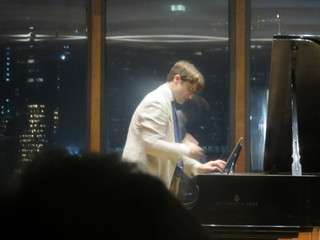|
Back
Darting Through the Cosmos New York
BargeMusic
07/07/2017 -
Ludwig van Beethoven: Seven Bagatelles, Opus 33
György Ligeti: Musica ricercata
Johannes Brahms: Six Klavierstücke, Opus 118
David Kaplan (Pianist)

D. Kaplan at BargeMusic (© Samuel A. Dog)
David Kaplan is not only a consummate artist, but he is never averse to taking daredevil chances. Playing modern music is one thing (which he does well), but he sprouted a kind of Heldenleben audacity by commissioning other composers to write music for him based on Robert Schumann’s Davidsbündler–the League of David. Schumann had good reason to name it this, but was Mr. Kaplan extolling his own name in asking for the music?
Ah, we don’t know, but the music on YouTube based loosely on the Schumann is made for the crisp no-nonsense Kaplan technique.
A technique which was put to good use–if questionable use at BargeMusic last night.
His idea was artistically simple (if pianistically challenging). The program consisted of 24 shortish movements from three totally different composers: one Austrian, one German, one Hungarian. Mr. Kaplan asserted in a short introduction that the movements did have something in common, and so he would show its commonality by mixing up one composer with the other. Not, of course, making a quodlibet of different tunes, but playing–sometimes with a pause, sometimes segueing–various movements from Johannes Brahms, György Ligeti and Ludwig van Beethoven.
All of this in a single work. Which, while I have doubts about his little adventure, was played with a fine, confident technique, an acuity of sounds, which was a pleasure to hear.
My reservations are simply that the three composers have a single commonality: the piano. After that, the moods, shadings and effects are, to say the least, quite different.
Yes, both Ligeti and the young Beethoven can joke, offer displacements and fool around with waltz rhythms. Brahms and Beethoven have their highly emotional phrasings, Ligeti and Brahms are...well, it’s difficult to put really put them together. Though Brahms, who probably didn’t know Frescobaldi, might have envied Ligeti’s early Baroque-style fugue, the penultimate work on the recital.
Initially, I started making notes on how Mr. Kaplan paired (or trio-ed) his music. Did the single-A-note Ligeti movement have any commonality with a Beethoven bagatelle? Did the crazy Ligeti waltz have any relation to the simple preceding Beethoven bagatelle?
Mr. Kaplan is not the kind of artist who throws pieces together to gauge the effect, so he could well have adjoined disparate music with related adjoining phrases. Yet, while that may have been his aim, the result was a curious one. In fact, his stupendous talent at the piano was sometimes either blurred or wasted by his game of relationships.
Nobody can resist the early Beethoven Bagatelles, the inspired “outtakes” from his voluminous notebooks. In fact, Mr. Kaplan played each one with an elegance, a cheekiness (the C Major Second Bagatelle) or the somewhat mad virtuosity of number 3. Yet I wanted to hear them together. Yes, they could have fit in with Ligeti’s equally cheeky irony, his micro-dynamics and his “play-as-fast-as-possible” notes. Yet just as music is not an international language, so Early Classical, Late Romantic and Eclectic 20th Century have little to do with each other.
More than Beethoven or Ligeti, Brahms suffered most in this recital. The composer in his last years was hardly the rebel, hardly the innovator of the first two. But basking in his bourgeois glory as he strolled around Vienna, his inspirations in the Opus 118 works was unparalleled. Mr. Kaplan played with dark fires and fierce impetuosity in the A Minor Intermezzo, as well as the other works in these masterworks.
Yet what one needs in the Brahms is mood, the mood of intimacy leading to inner thoughts, leading to Gypsy dances leading to the liaisons which only the composer knew. When one hears those almost painful moments of the second Intermezzo pairing it with a jazzier Ligeti...well, one loses the magic of the first and is startled rather than entertained by the second.
Mr. Kaplan did know his Ligeti Musica ricercata. Playing without a score, he pounded out the fffs of the first work and the impossible sffppss on the treble with a simultaneous pp or crescendo down at the bottom. And throughout the program, he bounded over the jazzy, the Bartók memorial, the insanely different (and difficult) pieces, ending with that massive fugue.
Finishing with a simple Beethoven Bagatelle made good musical sense (we needed time to exhale after the Ligeti), yet the cumulative effects of the entire recital was half-hearted.
Bless Mr. Kaplan for trying this mélange on the BargeMusic audience. I hope that he doesn’t repeat it for others. Composers have their own universes in which to play. Darting from cosmos to cosmos may be a clever game, yet at the end, one feels more than slightly cheated.
Harry Rolnick
|